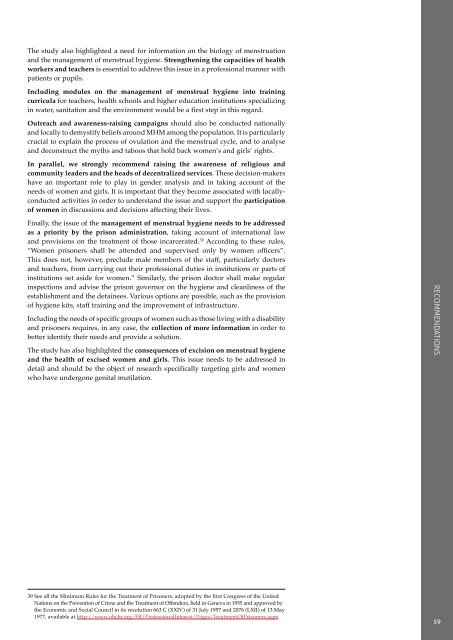1wE4FuZ
1wE4FuZ
1wE4FuZ
Create successful ePaper yourself
Turn your PDF publications into a flip-book with our unique Google optimized e-Paper software.
The study also highlighted a need for information on the biology of menstruationand the management of menstrual hygiene. Strengthening the capacities of healthworkers and teachers is essential to address this issue in a professional manner withpatients or pupils.Including modules on the management of menstrual hygiene into trainingcurricula for teachers, health schools and higher education institutions specializingin water, sanitation and the environment would be a first step in this regard.Outreach and awareness-raising campaigns should also be conducted nationallyand locally to demystify beliefs around MHM among the population. It is particularlycrucial to explain the process of ovulation and the menstrual cycle, and to analyseand deconstruct the myths and taboos that hold back women’s and girls’ rights.In parallel, we strongly recommend raising the awareness of religious andcommunity leaders and the heads of decentralized services. These decision-makershave an important role to play in gender analysis and in taking account of theneeds of women and girls. It is important that they become associated with locallyconductedactivities in order to understand the issue and support the participationof women in discussions and decisions affecting their lives.Finally, the issue of the management of menstrual hygiene needs to be addressedas a priority by the prison administration, taking account of international lawand provisions on the treatment of those incarcerated. 39 According to these rules,“Women prisoners shall be attended and supervised only by women officers”.This does not, however, preclude male members of the staff, particularly doctorsand teachers, from carrying out their professional duties in institutions or parts ofinstitutions set aside for women.” Similarly, the prison doctor shall make regularinspections and advise the prison governor on the hygiene and cleanliness of theestablishment and the detainees. Various options are possible, such as the provisionof hygiene kits, staff training and the improvement of infrastructure.Including the needs of specific groups of women such as those living with a disabilityand prisoners requires, in any case, the collection of more information in order tobetter identify their needs and provide a solution.The study has also highlighted the consequences of excision on menstrual hygieneand the health of excised women and girls. This issue needs to be addressed indetail and should be the object of research specifically targeting girls and womenwho have undergone genital mutilation.Recommendations39 See all the Minimum Rules for the Treatment of Prisoners, adopted by the first Congress of the UnitedNations on the Prevention of Crime and the Treatment of Offenders, held in Geneva in 1955 and approved bythe Economic and Social Council in its resolution 663 C (XXIV) of 31 July 1957 and 2076 (LXII) of 13 May1977, available at http://www.ohchr.org/FR/ProfessionalInterest/Pages/TreatmentOfPrisoners.aspx59



